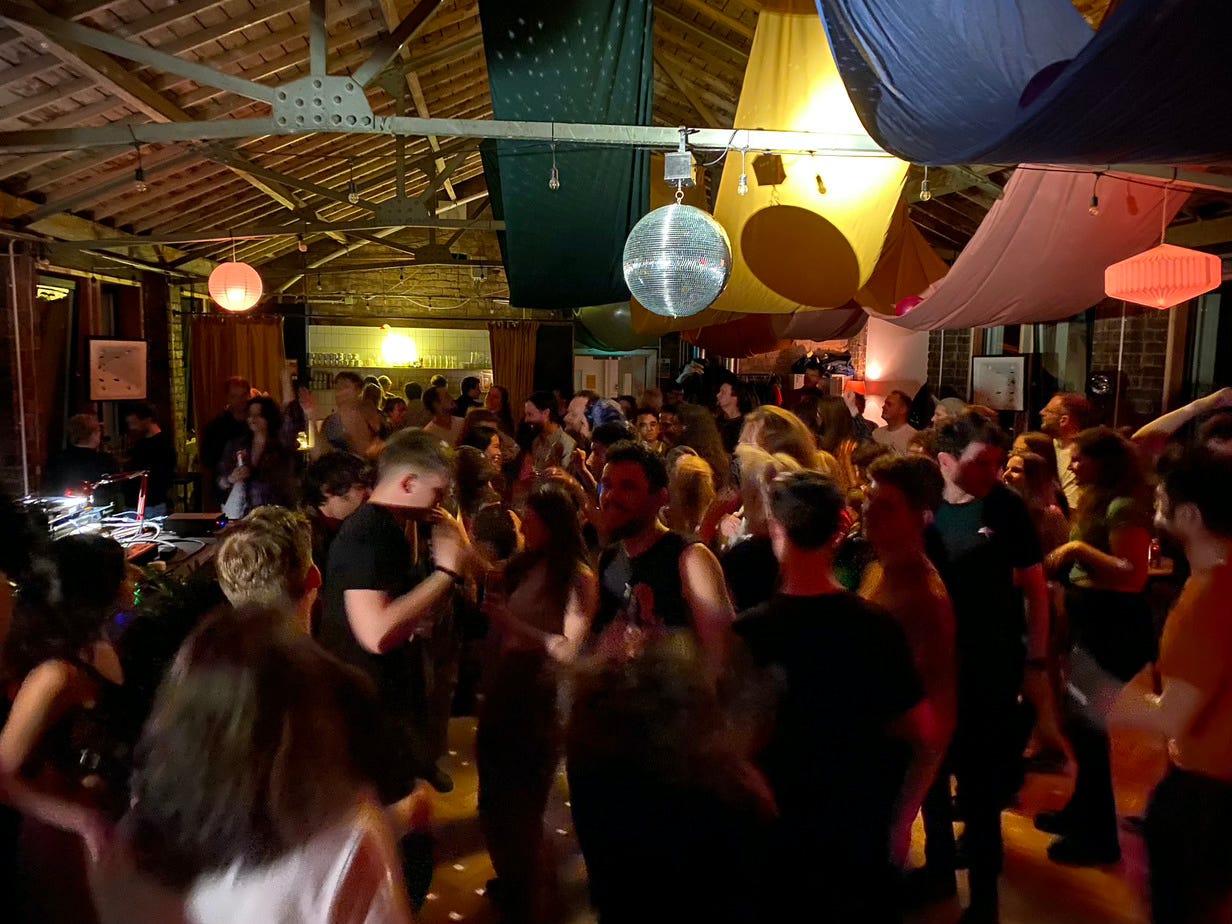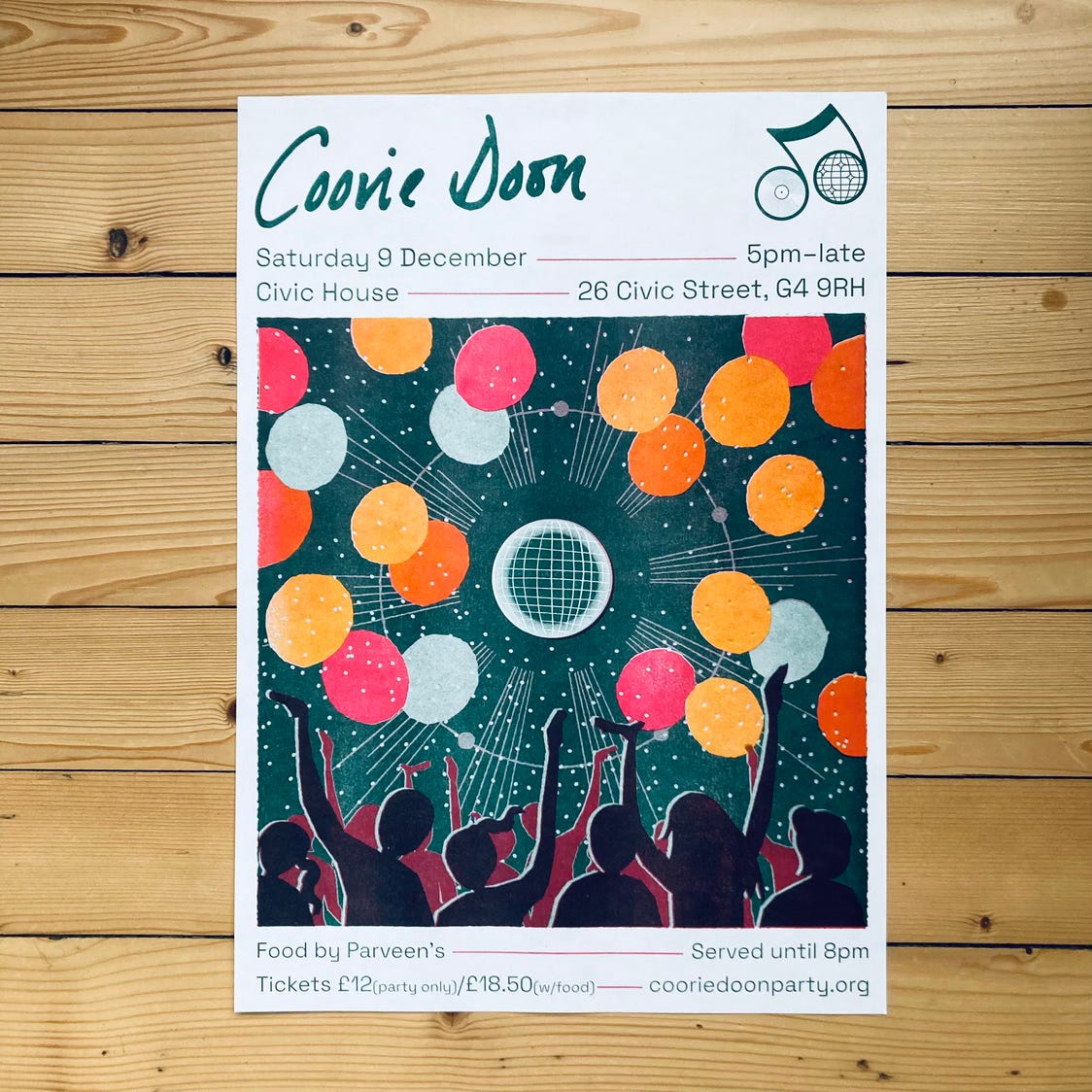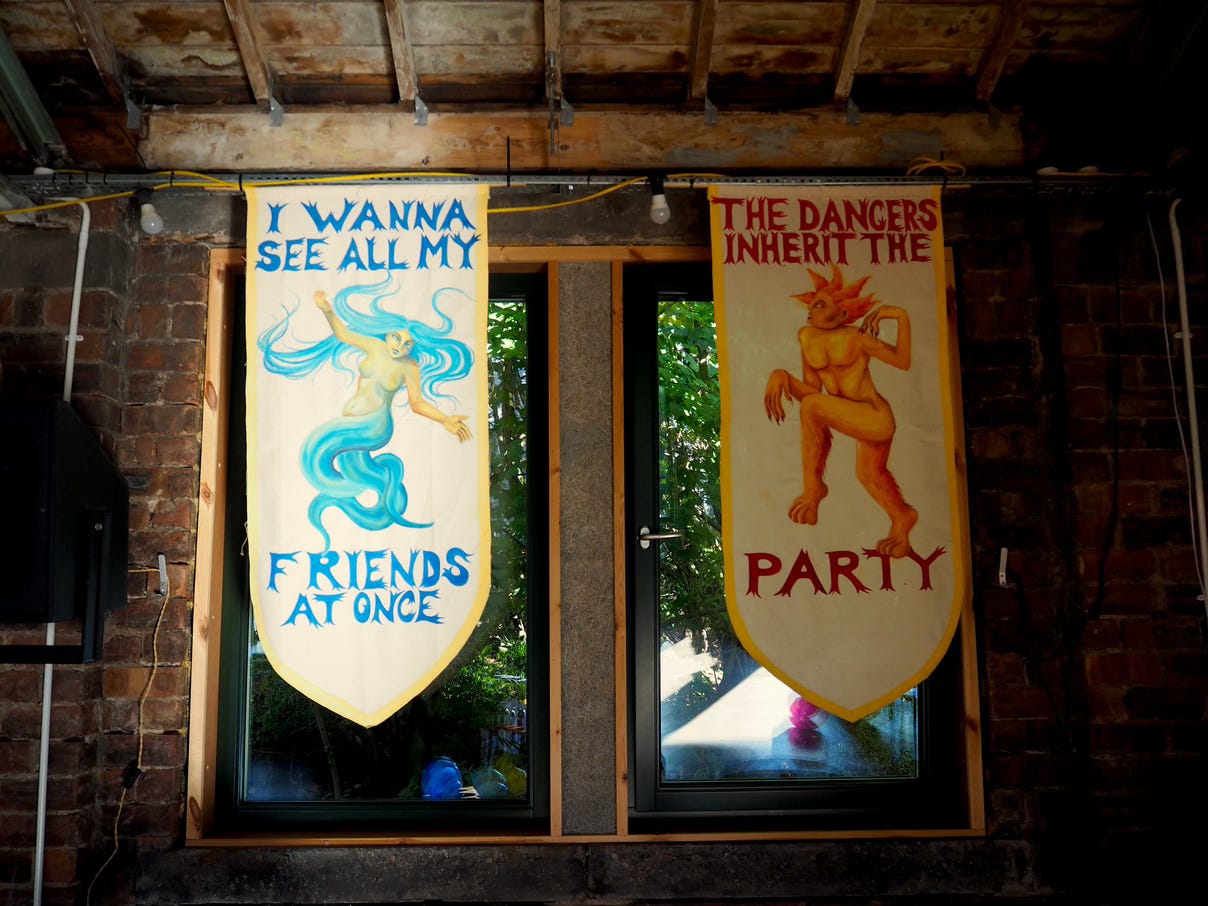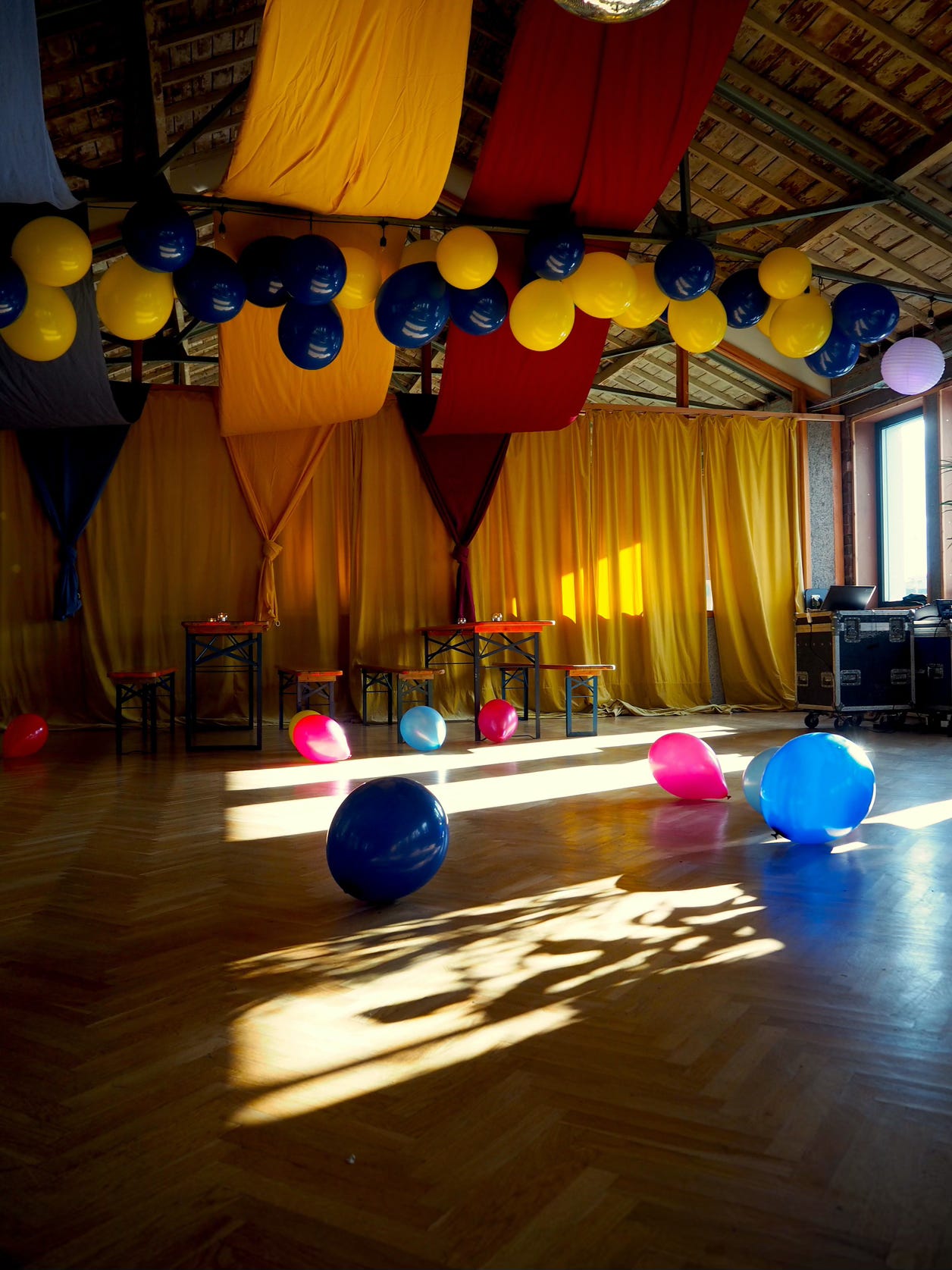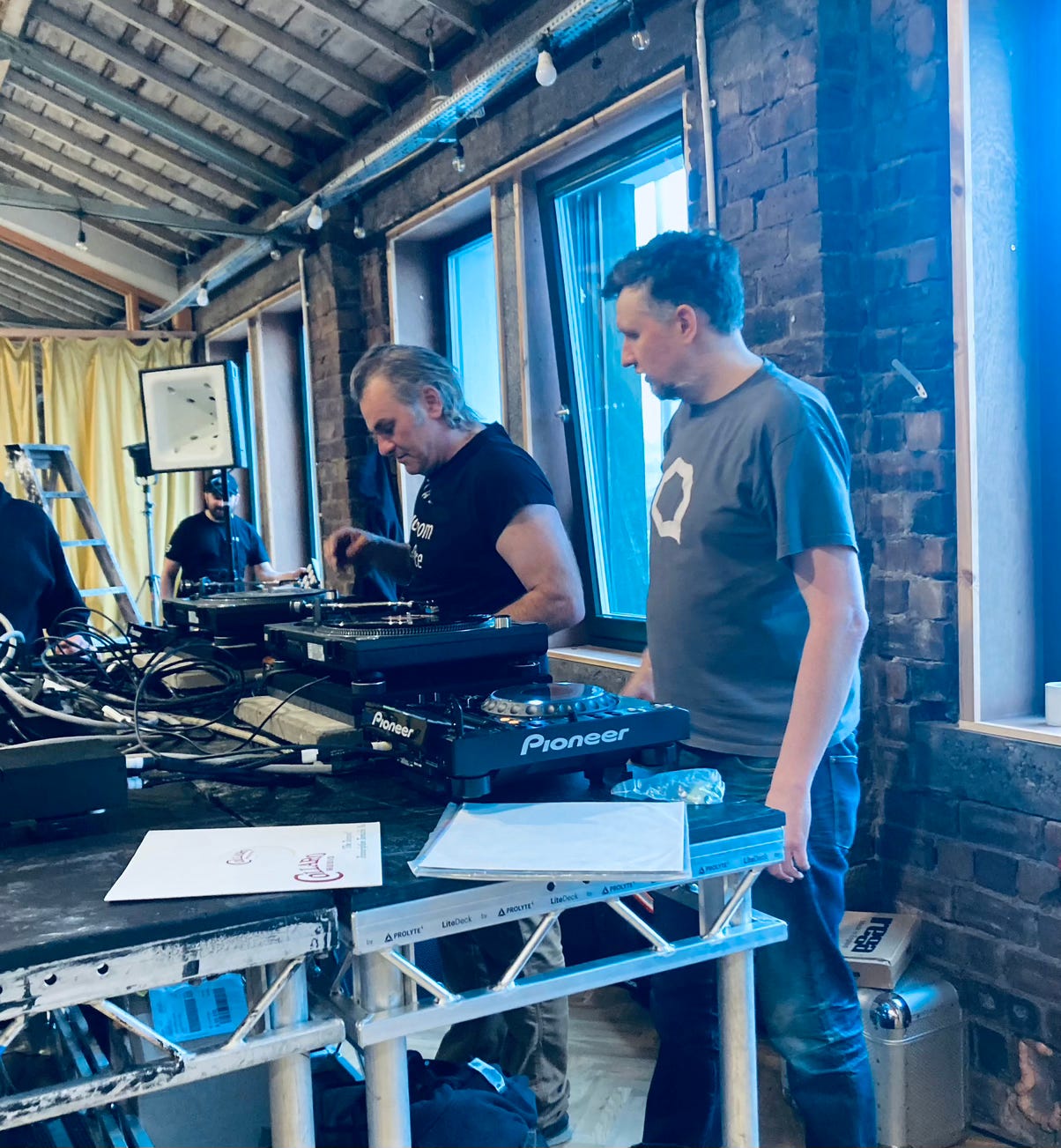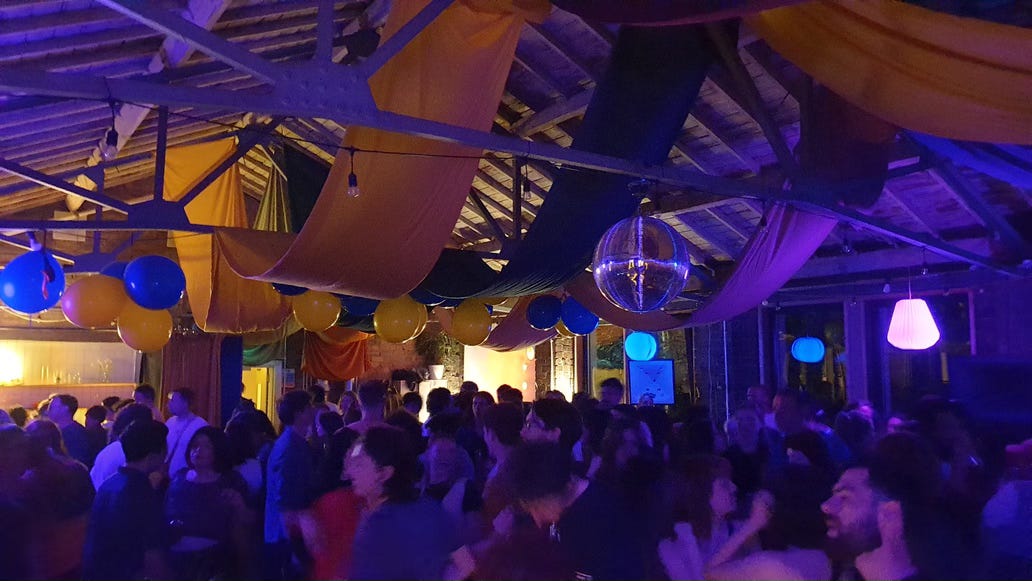#11 Deeper Into Outer Space | Coorie Doon
Glasgow's Coorie Doon on the roots of their party, the influence of David Mancuso and the surge in the popularity of high-end audiophile experiences...
From Glasgow to London via Sheffield, Leeds and Manchester, increasing numbers of high-end audiophile parties are turning listeners into believers across the land.
There’s a level of commitment in staging these events that goes beyond your typical club night. A focus is obviously on amazing sound - but they are often staged in temporary spaces and open to families alongside the dedicated dancers
I spoke to three - Apricot Ballroom, NAM (who have a permanent home) and Coorie Doon in Glasgow - for a recent piece for Vinyl Factory. All three are offering a variation on the original blueprint created by David Mancuso and, as with Man Power, there were too many great insights about these parties and places to not feature somewhere. So here’s the full Q&A with Coorie Doon ahead of their incoming party this Saturday (9th December)…
I'm interested in the roots of Coorie Doon and the inspiration of David Mancuso's Loft parties – could you talk about it started?
Kieran (K): The roots of the party began with a connection made through Colleen ‘Cosmo’ Murphy’s Balearic Breakfast radio show. I am an active member of the show’s online community and Colleen had invited me to DJ at the launch for the first Balearic Breakfast compilation. Finlay saw a post about this on Instagram and messaged me asking if I’d ever considered doing a Loft-style party in Glasgow. We met for a drink to discuss our Loft obsession and Finlay invited Cameron. The three of us instantly got on and shared the same vision so we decided to give it a try.
Not really knowing where to begin, I reached out to Colleen for some advice. As David Mancuso’s friend and protogé, and founder member of the London Loft, Colleen was the perfect person to get advice from and connected us with two of the most influential people in the world of audiophile dance parties, Iain Mackie and Andrew Pirie. Iain is Director of Danley Distribution and A-Live Sound, and has installed some of the best sound systems for venues and events around the world. Andrew is a hi-fi expert at Loud & Clear, one of the UK’s leading high-end audio shops. Most importantly, they were both close associates of David Mancuso and involved with some of the parties he hosted in Glasgow in the early 2000s. They have also supported Colleen with the sound at the London Loft and, amazingly for us, they both happened to be based in and around Glasgow.
Finlay (F): The time away from parties and clubs over the pandemic really enabled reflection on my relationship with the experience of listening and dancing to music collectively. Over this period, I was listening to the Love is The Message podcast hosted by Tim Lawrence and Jeremy Gilbert, which gave me confidence in my perspectives and a new sense of what’s possible. Suddenly the walls I had envisioned between those legendary Loft parties I’d read about and Glasgow’s contemporary nightlife melted away. I think David Mancuso’s message of care, love, inclusion and liberation is really how all great parties operate, consciously or not, and that has to transmit through every detail of the experience. It's essentially a communitarian spirit of valuing the records, the artists that made them, and most importantly your fellow partygoers. To me the logical conclusion of that is prioritising all possible effort into the best sound, and most welcoming space you can manage.
This kind of high-end audio experience seems more popular than ever - why do you think this is?
K: If you go dancing and the sound quality is great then it gives you energy, you can socialise more easily because you can talk over the music, and you don’t leave with ringing ears. Bad sound, on the other hand, takes energy from you and makes connecting with people socially more difficult. I don’t think most people come away from an audiophile party thinking “that sounded incredible”, I think they may just have a more positive experience. But a lot of this is also to do with how most ‘audiophile dance parties’ are so influenced by the Loft and David Mancuso’s wider ethos of creating an inclusive, positive space for people. The audio is a very important part of the equation, but it is just one part.
F: Kieran’s nailed it.
“I think living in a world that increasingly atomises and individualises us, people need and desire genuine collective experiences of joy and will search out for it.”
From personal experience, it's getting harder to find spaces for those truly connected moments and it doesn’t seem to be the direction of the majority of clubs and festivals . I think the community around these kinds of egalitarian, hi-fi parties has reached a critical mass where in an age of online connection, people can find out about them more readily than in the past. It's great to see it resonating with so many people.
Cameron (C): In recent years there is a growing correlation between high-end audio and its use in playing diverse, exciting music. I spend quite a bit of time watching older demos and reviews of audiophile equipment and often the music being used is pretty uninspired (insert predominantly white and male English-speaking rock band from the seventies). The spurt in popularity of audiophile culture has come with a parallel desire to explore the diversity of sound that can be played through it. I love high-end audio but if I had the choice between two nights where one had an exceptional audiophile set up and was playing a run-of-the-mill mix or another night on a mediocre sound system but playing exciting and eclectic music then I’d definitely take the latter. Both are crucial ingredients, but I think the diversity of sounds being played behind the recent growth in popularity.
Could you talk a little about the ethos of your night? And how do you choose spaces to host events at?
K: We’ve always aimed for it to feel like a house party that was open to everyone. We wanted to create a space where everyone would feel welcome – especially people uncomfortable in traditional, commercial clubbing environments. We also wanted to get away from the idea of named DJs and guests. We try not to even mention ourselves by name.
We are also proudly non-profit. Any money the party takes from ticket sales, after costs, go straight back into making the next party better, commissioning local artists, and donating to charity.
“Finding the right venue was a real challenge as we didn’t want to use an existing club. The moment we walked into the first floor space at Civic House, we knew it was perfect. It has wooden floors and a vaulted ceiling which gives it great acoustics. It feels like it could be someone’s home which adds to the feeling of a house party.”
During the week it’s a co-working space and they don’t really use it for public parties so we were delighted when they agreed to let us host Coorie Doon there. We have to mention Grace Winteringham, who leads the project work at the venue, as she put faith in us and really got behind the idea. If it wasn’t for her support, I’m not sure we would have got it off the ground.
F: It's about the music, doing away with unspoken rules and convention, knowing that music loved across life in so many settings can be enjoyed and experienced at a party, collectively, with the right appreciation of sound and moment. There’s a great freedom that comes with that approach you can feel throughout the party and at other parties in this tradition. Our attendees and our party could only be in Glasgow, and we try to ground ourselves in that. The name Coorie Doon comes from a song by Matt McGinn, a legendary Glaswegian folk singer whose music and life is a source of inspiration. The song tells of a daughter being sung to sleep, while her father is down in the mine, the other name for the song is Miners Lullaby. It speaks of a transcendent ability and desire for us to find moments of warmth, embrace and contentedness, whether in the dark wintery streets of Glasgow today, down in the mine, or in the comfort of the home.
The ongoing narrative around nightlife is one of the death of club culture - how are audiophile events like yours pushing against this?
F: We’ve all had some of the best musical and social experiences of our lives in clubs, and club culture can be such a positive force. Those experiences are usually grounded in the same principles you would find in a Loft party, of care, love and liberation, expressed in a beautifully diverse array of sounds, styles and interactions. If that’s what we mean by club culture, I would agree this is harder and harder to find in club spaces. All we’re doing is trying to re-centre those principles, and thankfully a lot of others have been doing this for a while and we can take much inspiration. The reality is audiophile events like our party aren’t particularly profitable, and require a lot of work behind each one, so it’s about taking an approach that counters the increasing commodification and profit driven nature of nightclubs. It's also about returning to a local focus, relying on the talent and capabilities of the place. This slide in club culture happens within a wider social and economic context, one in which living conditions are squeezed, land and property is speculated upon, inequality increases and gentrification alters who our towns and cities are designed for. I would say this is really the most important aspect of how we organise to reimagine club culture today.
K: I stopped going to clubs a long time ago. I became jaded by the club scene and as I got older I didn’t really have the desire to be out all night.
“For a long time I really missed dancing and always wanted a more relaxed place where I could dance to a wide variety of music that I loved. I think a lot of people start to feel the same at a certain point in their lives and that’s maybe why our party has found an audience.”
It starts early (5pm) and finishes early (1am), you can bring kids along for the first few hours, there’s food available etc. A lot of other ‘audiophile dance parties’ follow a similar format and I think this has got people, who have maybe felt alienated by traditional clubbing environments, returning to the dance floor.
C: I agree that aspects of modern nightlife are in a bit of a grim state. The ethos of these modern super-clubs that are built with predestined expiry dates where they’ll be closed and cleared to make room for new luxury flats is a depressing reality that’s a world away from what we aim for. Commercialisation is everywhere and dancing to music should be an escape from this rather than an extension. Being a non-profit organisation is a big part of how we’re trying to push against this.
There are loads of examples in Glasgow and the UK of nightlife shining. You just have to search a little harder in your local community to find it. On the national scale though I went down to Leeds earlier this year for a Cosmic Slop and it was an incredible experience; I haven’t stopped talking about it since. Even as a fresh face I felt instantly welcomed and as if I was part of something larger than just another night out. The whole concept of integrating nightlife into a community, providing musical education and life skills to disadvantaged young people using a party's profits is such a beautiful idea.
Could you talk about the sound system? And how do you maintain it?
K: We have two Technics SL-1210 MK2s fitted with Isonoe isolation feet and Audio-Technica VM740ML cartridges with 10CB conical stylus’, two Pioneer CDJs, and a Condesa Lucia mixer with an upgraded linear power supply.
Then we go into the serious stuff which is provided to us by Loud & Clear. This includes very high-end Chord Company mains and connection cables, two Moon 230HAD DACs, Chord PowerHAUS and Isol-8 Powerline mains blocks, and Black Ravioli isolation pads. All of this helps us to achieve the cleanest of signals to the Danley Sound Labs system which we hire from A-Live Sound.
The Danley set-up is configured as a five-point system with two main left and right speakers and a mono in the middle which all face towards the booth. Then we have two speakers on either side of the booth running at a much lower volume. This has the effect of most of the sound coming towards the booth rather than from it. The purpose of this is to try and take the focus away from those who are playing the music and encourage the dancers to face each other instead. To the best of my knowledge this configuration was actually designed by David Mancuso himself for the Loft.
What are the challenges of hosting your events?
F: It always feels like juggling a lot of moving pieces. We’re incredibly lucky in that we have partners and a volunteer community who completely get what we are trying to do and help deliver the sound, the space and the food amongst other things going on. It wouldn't be possible without them. A lot of audiophile parties own their sound system, some are integrated with their venue. Without having capital for those two key aspects, we need to rely on a network of well intentioned people and that comes with a lot of work. Our party model just about breaks even if we sell out, and we want to always prioritise affordability, so we have to accept a level of risk and uncertainty going into each event. I think none of us take the task of delivering the party lightly, it means so much to us and we have so much respect for all guests who come along. That great privilege and burden definitely weighs on us for each party, and we really rely on each other to manage the mental and emotional rollercoaster.
K: Agree with everything Finlay said, and just want to reiterate how lucky we are to have found people who are eager to come and volunteer with us and spend much of their weekend decorating the space, carrying very heavy speakers up and down a flight of stairs, welcoming guests at the door, and generally being lovely generous people. Some of them are friends from before and some are people who we’ve met through the party, but it couldn’t happen without them.
How have you built a community and found an audience, particularly in a 'techno' city such as Glasgow? In London, it seems like there are plenty of Mancuso inspired events - but elsewhere not so much. Why do you think this is?
K: I’ve never really seen Glasgow as a ‘techno city’ personally. There’s always been lots of other great scenes - Northern Soul, funk, reggae, jazz etc - although admittedly they are smaller. We always wanted to play a wide variety of music and switch between genres over the course of the night. I would say that is perhaps less common in Glasgow, but the dancers always respond really well. It feels like there’s more of an openness now to hearing a variety of sounds.
F: Immersing myself in the hi-fi party world, it really did seem like anywhere outside of the world's major cities was overlooked and lacking, with some amazing exceptions. That was a major source of inspiration for the party, ensuring we can have those kinds of experiences here.
“A well known passage in Alasdair Gray's Lanark sees two characters discussing why no one notices how magnificent a city Glasgow is, in contrast to Florence, Paris etc. The character explains that if a city hasn’t been used by artists, hasn’t engaged with utopian imaginaries, then its inhabitants do not live there imaginatively. This idea further propelled me to get up and do something.”
Glasgow has a varied and amazing musical heritage, though I think that techno label is not misplaced. The combination of short, compressed licensed hours for clubs, the nature of people here and the techno legacy really creates an intense night out experience which definitely manifests at our nights, I wouldn’t have it any other way.
C: Before putting tickets on sale for our first party it was a real unknown, what kind of response we would get to it. In our heads there was a definite demand but a lot of it stems from our involvement in internet spaces. Would it transpire in real life? We’ve been very fortunate to see demand that exceeded our optimistic predictions, however. Every night has been a sell out and our next date in December went on sale last week and we’re nearly sold out already.
I don’t think it right to say that everyone who comes is drawn by the influence of The Loft though. I’m sure a lot of people who have attended Coorie Doon are completely unaware of the story of David Mancuso. It’s more just the feeling of something a bit different that sets us apart.
I think a large barrier to doing this kind of party is the organisation involved. The plug and play approach of just using an existing nightclub is just so much less hassle and modern life just doesn’t afford the breathing space to let things like this happen. We got very lucky in finding our venue, our sound system, and some amazing people who have believed in the idea. So many puzzle pieces that just happened to fall into place at the right time that it’s almost uncanny.
The venue especially I believe presents a big preventative from seeing more events like these popping up. Finding unorthodox and suitable spaces for loud music is just so difficult (this is not a barrier exclusive to smaller cities though, I’m sure it’s, if anything, more difficult in London). There are so many beautiful buildings in UK cities that are just falling into disrepair and with a bit of funding could be transformed and turned into great spaces for dancing and building community.
What does the future of your party look like for you?
K: It felt like a massive achievement to even manage one party. To be here nearly a year later and just about to host our fourth, and to have built up a community of dancers feels pretty special. I’d be happy to keep going as it is and make small improvements each time - small upgrades to the equipment, put more effort into decorating the room, collaborate with local artists to create more visuals to hang in the space. We have discussed running cultural events alongside the party – talks, workshops, album listening events - but we’ll see what happens.
C: Personally, I’d like to get a bit more hands on with the audio. The audiophile approach to running a party is always going to be a learning experience and I have a background in acoustics and music technology that I’d like to utilise a bit more through a hobbyist approach. As mentioned before I’ve been on trips down to Leeds and Manchester in the past year for the parties Cosmic Slop and Do One in respective cities. Both have self-built elements to their sound system and I’ve got an itch to explore this myself. Again, just finding the time and mental capacity to actually sit down and plan/research this is a barrier I’m going to need to find a way around!
Visit cooriedoonparty.org for more. The next party takes place on 9th December at Civic House.

